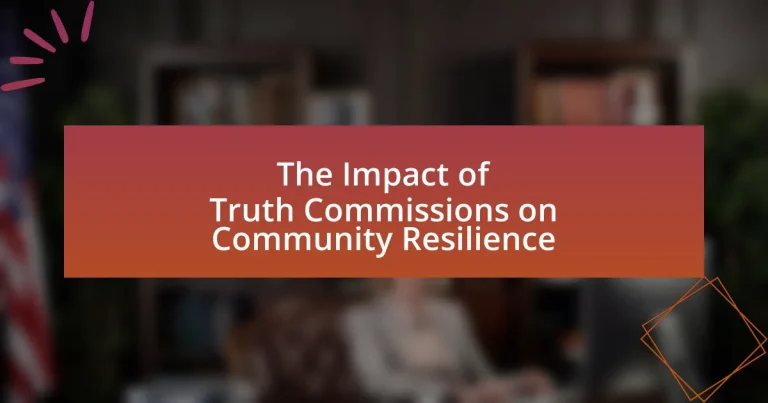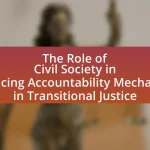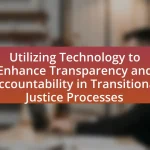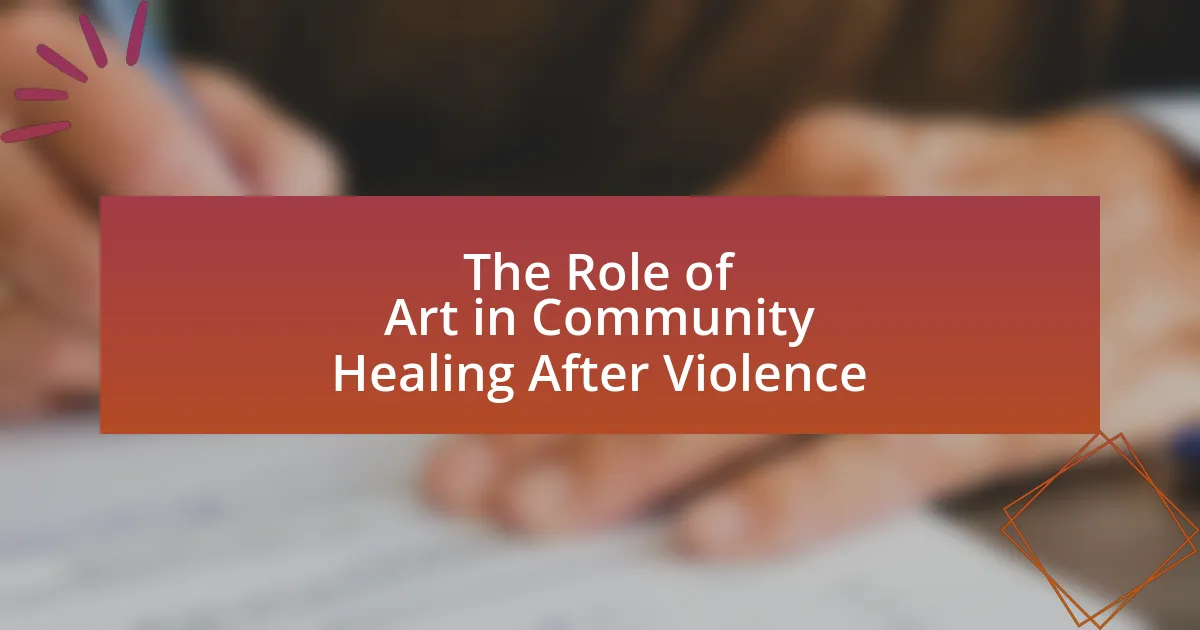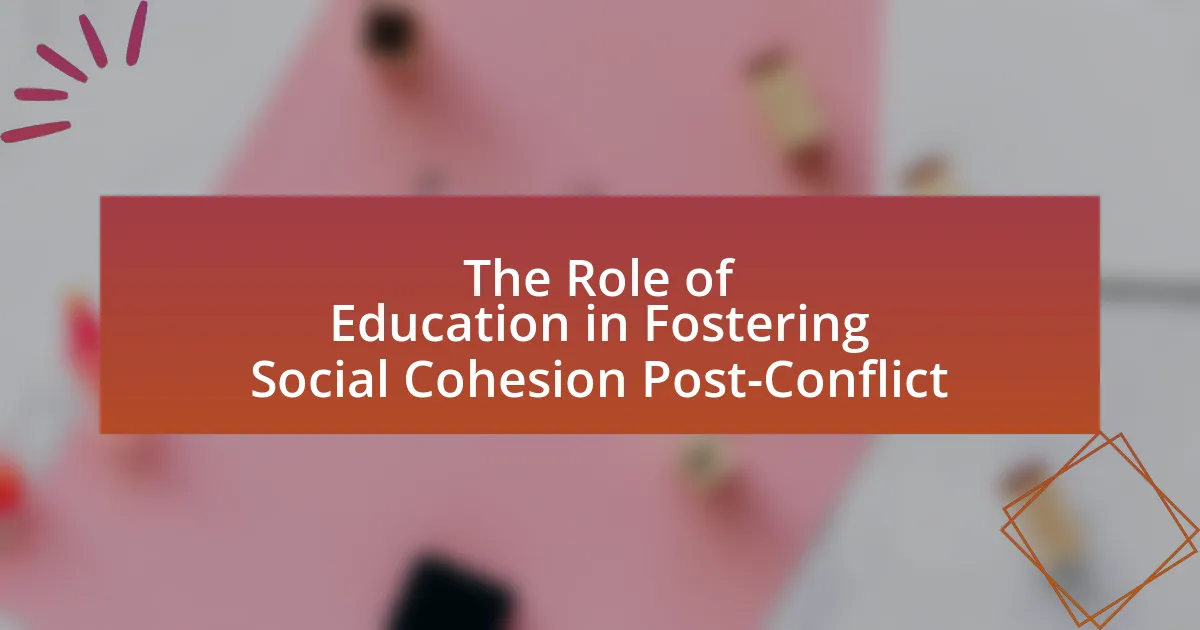Truth commissions are official bodies established to investigate human rights violations and injustices during periods of conflict or authoritarian rule, with the aim of uncovering the truth, promoting accountability, and fostering reconciliation. This article examines the operational processes of truth commissions, such as data collection and stakeholder engagement, and their role in addressing historical injustices and enhancing community resilience. It also discusses the challenges these commissions face, including political resistance and public trust issues, while highlighting best practices for improving their effectiveness and community involvement. The impact of truth commissions on social cohesion and long-term community relationships is analyzed, emphasizing their significance in promoting healing and rebuilding trust within affected societies.
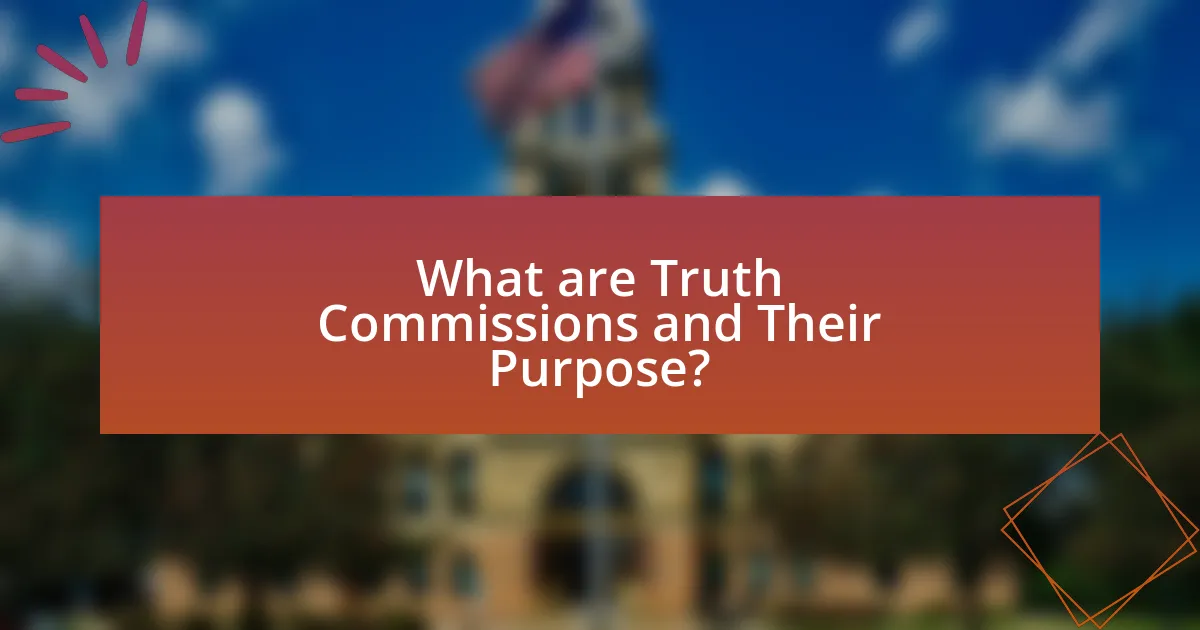
What are Truth Commissions and Their Purpose?
Truth commissions are official bodies established to investigate and report on human rights violations and injustices that occurred during periods of conflict or authoritarian rule. Their primary purpose is to uncover the truth about past abuses, promote accountability, and foster reconciliation within affected communities. For example, the South African Truth and Reconciliation Commission, established in 1995, aimed to address the atrocities committed during apartheid, providing a platform for victims to share their experiences and for perpetrators to confess their crimes in exchange for amnesty. This process not only aimed to document history but also sought to heal societal wounds and build a foundation for future peace and stability.
How do Truth Commissions operate in post-conflict societies?
Truth Commissions operate in post-conflict societies by investigating and documenting human rights violations that occurred during periods of conflict. These commissions gather testimonies from victims, perpetrators, and witnesses to create a comprehensive account of events, which helps to establish a historical record. For example, the South African Truth and Reconciliation Commission, established in 1995, aimed to address the atrocities of apartheid by promoting transparency and accountability, ultimately fostering national healing. The findings of these commissions often lead to recommendations for reparations and policy changes, contributing to societal reconciliation and resilience.
What processes are involved in the establishment of a Truth Commission?
The establishment of a Truth Commission involves several key processes, including the mandate creation, stakeholder engagement, data collection, and reporting. Initially, a government or relevant authority defines the commission’s mandate, outlining its objectives, scope, and duration. This is followed by engaging various stakeholders, such as victims, civil society organizations, and political entities, to ensure diverse perspectives are included. Data collection is then conducted through testimonies, documentation review, and field investigations to gather evidence of human rights violations. Finally, the commission compiles its findings into a report that is presented to the public and relevant authorities, often recommending measures for accountability and reconciliation. These processes are critical for fostering transparency and promoting healing within affected communities.
How do Truth Commissions gather testimonies and evidence?
Truth Commissions gather testimonies and evidence through structured interviews, public hearings, and the collection of documents. These commissions often employ trained staff to conduct interviews with victims, perpetrators, and witnesses, ensuring that testimonies are recorded accurately and respectfully. Public hearings allow for broader community engagement, where individuals can share their experiences in a safe environment, contributing to a collective understanding of past events. Additionally, Truth Commissions may analyze existing documents, such as government records and reports from non-governmental organizations, to corroborate testimonies and establish a comprehensive historical record. This multi-faceted approach enhances the credibility and depth of the findings, as evidenced by the South African Truth and Reconciliation Commission, which utilized these methods to address human rights violations during apartheid.
What role do Truth Commissions play in addressing historical injustices?
Truth Commissions play a crucial role in addressing historical injustices by facilitating the acknowledgment of past wrongs and promoting reconciliation within affected communities. These commissions investigate human rights violations, document testimonies from victims, and provide a platform for public acknowledgment, which helps to validate the experiences of those who suffered. For instance, the South African Truth and Reconciliation Commission, established in 1995, revealed the extent of apartheid-era abuses, fostering a national dialogue that contributed to healing and rebuilding trust among diverse groups. By uncovering the truth, these commissions not only hold perpetrators accountable but also empower victims, thereby enhancing community resilience and promoting a shared understanding of history.
How do Truth Commissions contribute to national healing?
Truth Commissions contribute to national healing by facilitating the acknowledgment of past injustices and fostering dialogue among affected communities. These commissions investigate human rights violations, allowing victims to share their experiences, which promotes collective memory and understanding. For instance, the South African Truth and Reconciliation Commission, established in 1995, played a crucial role in addressing the atrocities of apartheid, leading to a national discourse on forgiveness and reconciliation. By uncovering the truth, these commissions help to validate the suffering of victims, which is essential for psychological healing and rebuilding trust within society.
What impact do Truth Commissions have on victims and survivors?
Truth Commissions significantly impact victims and survivors by providing a platform for acknowledgment, validation, and healing. These commissions facilitate the documentation of human rights abuses, allowing victims to share their experiences, which can lead to a sense of recognition and closure. For instance, the South African Truth and Reconciliation Commission, established in the 1990s, enabled thousands of victims to testify about their suffering, contributing to national healing and reconciliation efforts. Research indicates that such processes can enhance psychological well-being and foster community resilience by promoting collective memory and understanding of past injustices.
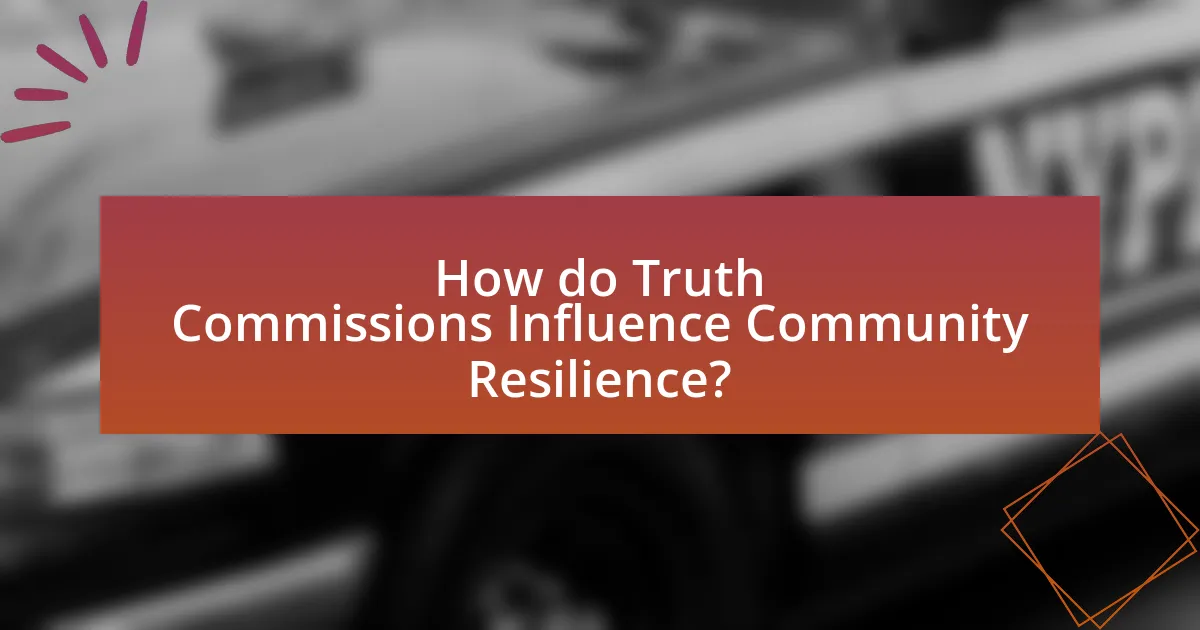
How do Truth Commissions Influence Community Resilience?
Truth commissions influence community resilience by fostering dialogue, promoting healing, and facilitating reconciliation among affected populations. These commissions provide a platform for victims to share their experiences, which helps validate their suffering and encourages collective acknowledgment of past injustices. For instance, the South African Truth and Reconciliation Commission, established in 1995, played a crucial role in addressing the traumas of apartheid by allowing victims to recount their stories, thereby contributing to a shared understanding of the past. This process not only aids in individual healing but also strengthens community bonds by promoting empathy and understanding among diverse groups. Furthermore, truth commissions often recommend reparative measures and institutional reforms, which can enhance trust in governance and social cohesion, ultimately leading to increased community resilience in the face of future challenges.
What mechanisms do Truth Commissions use to foster community resilience?
Truth Commissions foster community resilience through mechanisms such as public hearings, documentation of human rights violations, and community engagement initiatives. Public hearings allow victims and perpetrators to share their experiences, promoting dialogue and understanding within the community. Documentation of human rights violations creates a historical record that acknowledges suffering and fosters collective memory, which is essential for healing. Community engagement initiatives, such as workshops and outreach programs, empower local populations to participate in the reconciliation process, thereby strengthening social cohesion and resilience. These mechanisms have been observed in various contexts, such as the South African Truth and Reconciliation Commission, which aimed to rebuild trust and promote healing in a divided society.
How does public acknowledgment of past atrocities strengthen communities?
Public acknowledgment of past atrocities strengthens communities by fostering healing and reconciliation among affected individuals. When communities openly recognize and discuss historical injustices, it creates a shared understanding of the trauma experienced, which can lead to collective healing. For instance, truth commissions, such as South Africa’s Truth and Reconciliation Commission, have demonstrated that public acknowledgment can facilitate dialogue, promote empathy, and encourage restorative justice practices. This process not only validates the experiences of victims but also helps to build trust within the community, ultimately enhancing social cohesion and resilience against future conflicts.
What role does reconciliation play in building community resilience?
Reconciliation plays a crucial role in building community resilience by fostering trust and social cohesion among community members. When communities engage in reconciliation processes, such as those facilitated by truth commissions, they address historical grievances and promote healing, which strengthens interpersonal relationships. For instance, the South African Truth and Reconciliation Commission demonstrated that acknowledging past injustices and facilitating dialogue can lead to a more unified society, ultimately enhancing resilience against future conflicts. This process not only helps individuals cope with trauma but also encourages collective action and solidarity, essential components for a resilient community.
How do Truth Commissions affect social cohesion within communities?
Truth Commissions enhance social cohesion within communities by facilitating dialogue, acknowledging past injustices, and promoting reconciliation. These commissions provide a platform for victims to share their experiences, which fosters understanding and empathy among community members. For instance, the South African Truth and Reconciliation Commission, established in 1995, played a crucial role in addressing the atrocities of apartheid, allowing for public testimonies that helped to heal divisions and build a more unified society. Research indicates that communities that engage with Truth Commissions often experience increased trust and cooperation, as the process encourages collective memory and accountability, ultimately contributing to long-term social stability.
What are the long-term effects of Truth Commissions on community relationships?
Truth Commissions have significant long-term effects on community relationships, primarily fostering reconciliation and trust among previously divided groups. By providing a platform for victims to share their experiences and for perpetrators to acknowledge their actions, these commissions facilitate dialogue and understanding, which can mend fractured relationships. For instance, the South African Truth and Reconciliation Commission, established in the 1990s, is often cited for its role in promoting national healing and rebuilding trust among communities post-apartheid. Research indicates that communities engaged in truth-telling processes report higher levels of social cohesion and lower incidences of violence, demonstrating the positive impact of these commissions on long-term community dynamics.
How do Truth Commissions address divisions within communities?
Truth Commissions address divisions within communities by facilitating dialogue, promoting reconciliation, and uncovering historical truths. These commissions create a platform for victims and perpetrators to share their experiences, fostering understanding and empathy among community members. For instance, the South African Truth and Reconciliation Commission, established in 1995, aimed to heal the nation post-apartheid by documenting human rights violations and encouraging public testimonies, which helped to bridge divides and promote social cohesion. By acknowledging past injustices and validating the experiences of marginalized groups, Truth Commissions contribute to rebuilding trust and resilience within communities.
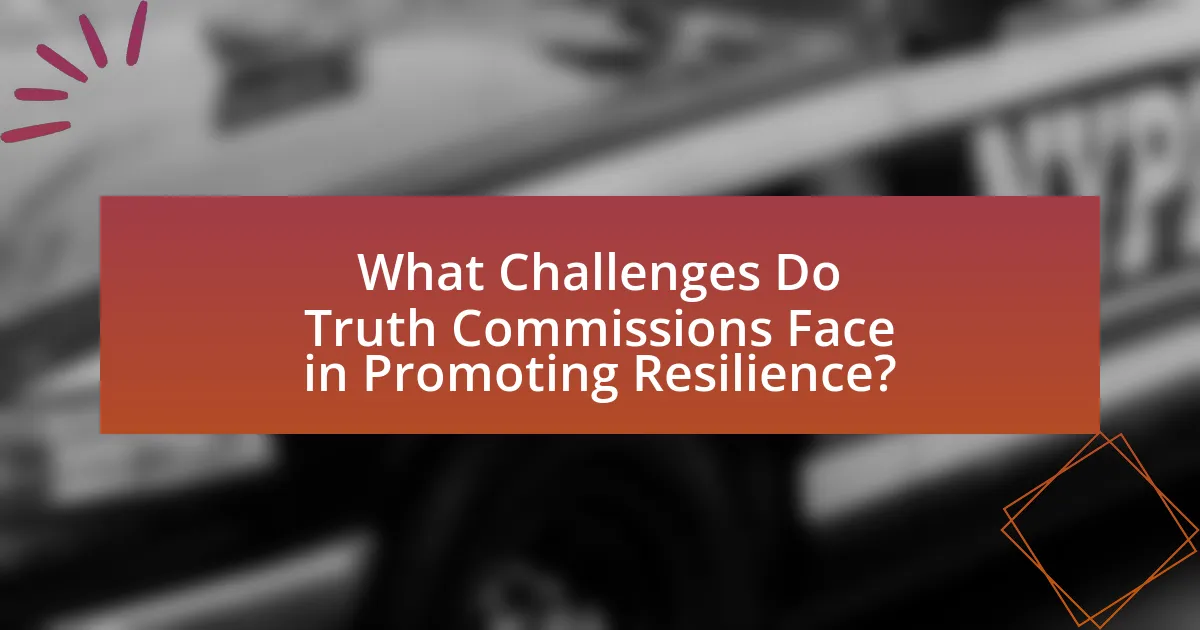
What Challenges Do Truth Commissions Face in Promoting Resilience?
Truth commissions face significant challenges in promoting resilience, primarily due to issues of credibility, political resistance, and societal division. Credibility is often undermined when commissions are perceived as biased or lacking impartiality, which can lead to distrust among affected communities. Political resistance arises when governments or influential groups oppose the findings or recommendations of the commission, hindering the implementation of necessary reforms. Additionally, societal division can be exacerbated by the commission’s work, as different groups may interpret the findings in conflicting ways, leading to further polarization rather than healing. These challenges are evident in various historical contexts, such as the South African Truth and Reconciliation Commission, where skepticism about the process and outcomes affected its ability to foster national unity and resilience.
What are the common criticisms of Truth Commissions?
Common criticisms of Truth Commissions include their perceived ineffectiveness in delivering justice, potential for selective memory, and the risk of undermining legal accountability. Critics argue that Truth Commissions often fail to hold perpetrators accountable, as seen in the South African Truth and Reconciliation Commission, where many offenders received amnesty. Additionally, these commissions may focus on specific narratives, leading to accusations of bias and exclusion of marginalized voices, which can perpetuate divisions within communities. Furthermore, some argue that the process can create a false sense of closure, as victims may feel that their grievances are not adequately addressed, ultimately hindering community resilience.
How do political influences impact the effectiveness of Truth Commissions?
Political influences significantly impact the effectiveness of Truth Commissions by shaping their mandate, operations, and public perception. When political leaders support Truth Commissions, they can facilitate access to information and resources, enhancing the commission’s ability to uncover truths and promote accountability. Conversely, if political entities oppose or manipulate the process, it can lead to limited investigations, biased reporting, and a lack of public trust. For example, in South Africa, the Truth and Reconciliation Commission was bolstered by political support from Nelson Mandela’s government, which helped it achieve its goals of national healing and reconciliation. In contrast, in countries like Guatemala, political resistance has hindered the effectiveness of Truth Commissions, resulting in incomplete narratives and ongoing impunity for perpetrators. Thus, the political context directly influences the operational capacity and societal impact of Truth Commissions.
What challenges do Truth Commissions encounter in gaining public trust?
Truth Commissions encounter several challenges in gaining public trust, primarily due to perceptions of bias, lack of transparency, and historical grievances. These commissions often face skepticism from communities that believe they may not represent all perspectives or that they may be influenced by political agendas. For instance, in South Africa, the Truth and Reconciliation Commission struggled with public trust because many victims felt their experiences were not adequately acknowledged, leading to feelings of betrayal. Additionally, if the processes and findings of the commissions are not transparent, it can further erode trust, as seen in the case of the El Salvador Truth Commission, where limited access to information led to doubts about the integrity of its conclusions.
How can Truth Commissions improve their impact on community resilience?
Truth Commissions can improve their impact on community resilience by fostering inclusive dialogue and promoting accountability for past injustices. By facilitating open discussions among diverse community members, Truth Commissions help to rebuild trust and social cohesion, which are essential for resilience. For instance, the South African Truth and Reconciliation Commission successfully engaged various stakeholders, leading to a greater understanding of historical grievances and collective healing. This process not only acknowledged victims’ experiences but also encouraged community participation in shaping a shared narrative, ultimately strengthening social bonds and resilience against future conflicts.
What best practices can be adopted to enhance the effectiveness of Truth Commissions?
To enhance the effectiveness of Truth Commissions, it is essential to ensure inclusivity and community engagement throughout the process. Engaging diverse stakeholders, including victims, marginalized groups, and local communities, fosters trust and encourages broader participation, which is crucial for gathering comprehensive testimonies and perspectives. Research indicates that Truth Commissions that prioritize public hearings and community outreach, such as the South African Truth and Reconciliation Commission, achieve higher levels of public trust and legitimacy. Additionally, providing psychological support and protection for witnesses can lead to more open and honest testimonies, thereby enriching the commission’s findings. Implementing these best practices can significantly improve the overall impact of Truth Commissions on community resilience.
How can community involvement be increased in the Truth Commission process?
Community involvement in the Truth Commission process can be increased by implementing inclusive outreach strategies that engage diverse community members. These strategies may include organizing public forums, workshops, and focus groups that encourage participation from marginalized populations, ensuring that their voices are heard. Research indicates that when communities actively participate in the Truth Commission process, such as through the South African Truth and Reconciliation Commission, it fosters a sense of ownership and trust, ultimately enhancing community resilience.
What practical steps can communities take to leverage Truth Commissions for resilience?
Communities can leverage Truth Commissions for resilience by actively participating in the commission’s processes, ensuring representation of diverse voices, and utilizing the findings to foster dialogue and healing. Engaging in public hearings allows community members to share their experiences, which can validate individual and collective trauma, as seen in the South African Truth and Reconciliation Commission, where public testimonies contributed to national healing. Additionally, communities can organize workshops and discussions based on the commission’s reports to educate members about historical injustices and promote understanding, similar to initiatives in countries like Guatemala, where truth-telling has led to community-led reconciliation efforts. By integrating the commission’s recommendations into local policies and programs, communities can address root causes of conflict and build a foundation for sustainable peace and resilience.
